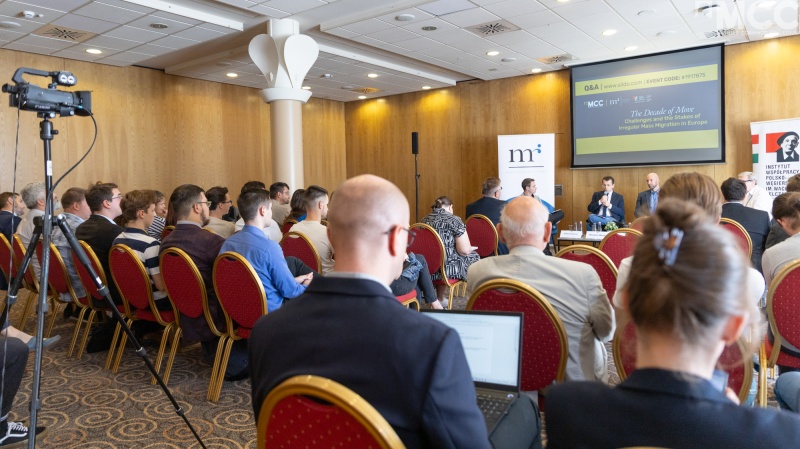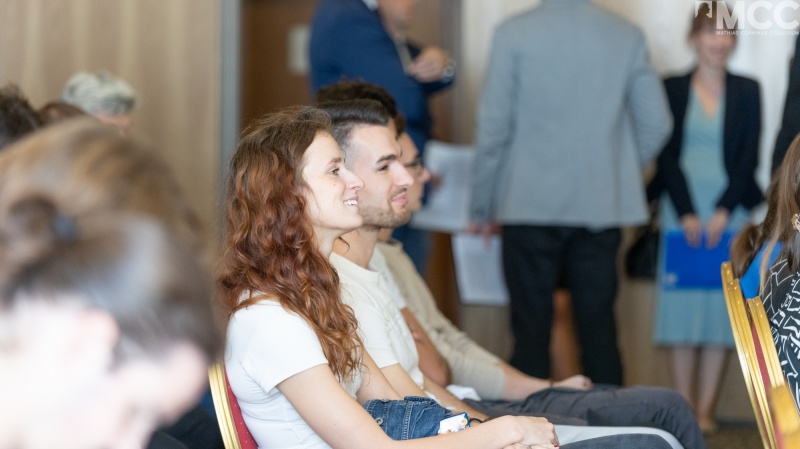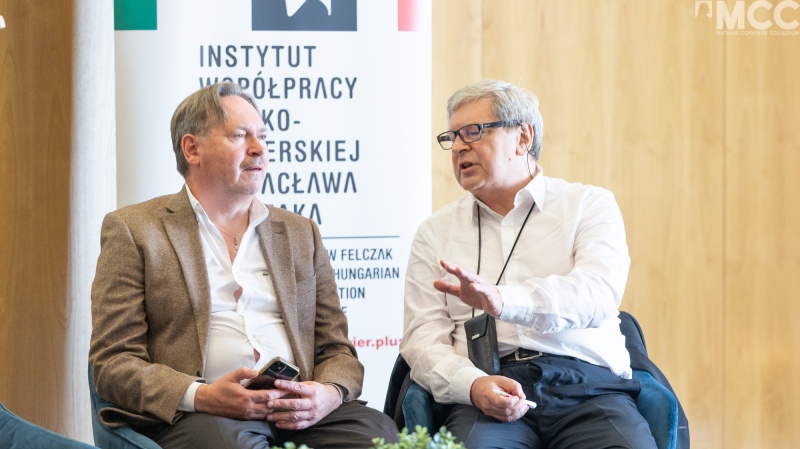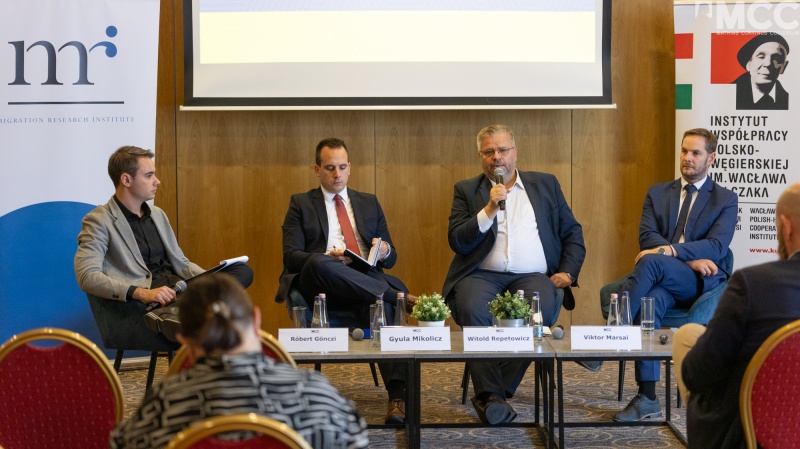Over 185,000 migrants arrived in the EU this year via the Mediterranean Sea. On Thursday, experts from various countries discussed the threats associated with the migration crisis. An ethnically and religiously diverse society can exist, but a multicultural society cannot," said Ralph Schoellhammer from Webster University in Vienna during the first panel of the international conference in Budapest titled "Decade of Movements. CHALLENGES AND STAKES OF IRREGULAR MASS MIGRATION IN EUROPE." Prof. Tomasz Grzegorz Grosse from the University of Warsaw warned that the multi-million illegal migration to Europe is not only very costly but also increases crime and raises the threat of terrorist attacks.
 Photo by Photo by Mihály Molnár/MCC
Photo by Photo by Mihály Molnár/MCC
The problem of mass migration to Europe has become one of the key topics of the 21st century. The migratory pressure on the European Union continues to escalate, sparking heated debates about the future of nations and the future of the Old Continent. Today, in Budapest, a substantive discussion took place among experts and commentators from various European countries, who assessed the gravity of the issue and attempted to find a solution. The conference at Maciej Korwin's College in Budapest was jointly organized by the Polish-Hungarian Cooperation Institute named after Wacław Felczak and the Hungarian Institute for Migration Studies.
During the first panel, Ralph Schoellhammer from Webster University in Vienna pointed out that the culture of a particular nation is not just about favorite dishes (although this is one of the important elements), but primarily about how children are raised, how men treat women in a given society, etc. - "I can't imagine a country where one part of society says that women must cover their hair, they cannot work, etc. And another part advocates for complete sexual freedom for women, etc. It just won't work," noted Professor Schoellhammer from Webster University in Vienna. - "The same people who convince us that Iraq should be divided into three parts because Iraqi Kurds, Shia, and Sunnis cannot peacefully co-create one country are now telling us that, for example, in Amsterdam, supporters of the right to same-sex marriage can coexist with those advocating for full sexual freedom and unrestricted access to pornography, as well as Islamic fundamentalists, and there will be no problems because of this," added Prof. Schoellhammer.

Photo by Mihály Molnár/MCC
We are witnessing a massive influx of illegal migrants into the European Union, numbering in the millions and coming from various cultures, mainly from Asian and African countries. The majority of them are Muslims, which poses a huge challenge for Europe in many different aspects," emphasized Professor Tomasz Grzegorz Grosse, a sociologist, political scientist, and historian from the University of Warsaw. "Firstly, we have a huge problem with the assimilation of migrants into our societies and persuading them to adopt our culture and values," added Prof. Grosse, stating that integration is not only very costly but in many cases simply impossible. He observed that in European countries, increasingly large immigrant communities are emerging, which have no intention of integrating and live alongside the host communities. "Secondly, with each wave of illegal migration, we observe an increase in crime as well as threats of terrorist attacks," warned the political scientist and sociologist from the University of Warsaw, noting that researchers are witnessing a rise in radicalization among members of communities, with increasingly hostile sentiments towards Jews, Christians, or the host nation's members in France, Germany, etc. He emphasized that this directly leads to revolutions or even civil wars," argued Prof. Tomasz Grzegorz Grosse, citing the example of this year's riots in Paris and other French cities. He pointed out that the majority of Poles oppose the relocation mechanism for migrants promoted by Brussels. "Seventy percent of Poles oppose the forced relocation of migrants because such a policy is ineffective, does not solve the problem, and only shifts it from one country to other states," stated Prof. Grosse.
"Italy needs migrants. They need them very much. Italy is rapidly depopulating, and Italian mothers are the oldest in Europe. Last year, 400,000 children were born in Italy, and it was the worst result since the founding of Italy in 1861," noted Piotr Kowalczuk, a long-time correspondent for Polish Radio in Rome, during the discussion in Budapest. "Italy needs immigrants; they need workers, but it cannot be uncontrolled and illegal immigration," emphasized Mr. Kowalczuk, pointing out that 70% of asylum applications submitted by people who have entered Italy are rejected. "When these people receive a negative decision, nothing bad happens to them. They can throw such a decision into the trash and stay in Italy or try to move to France, Scandinavia, or Germany. Sometimes they are exploited by dishonest Italian entrepreneurs, but they often become members of criminal organizations," recounted the long-time correspondent for Polish media in Italy, pointing out that it is estimated that there are currently around 600,000 illegal immigrants in the country, and no one really knows where they are, how they make a living, and what their intentions are. "Unemployment is high in Italy, so it is difficult for them to find work. As a result, we see more and more beggars on the streets of Italian cities. It is dangerous that due to the lack of prospects, these people start stealing and robbing, and eventually end up in prisons," added Mr. Kowalczuk, agreeing that the idea of compulsory relocation of migrants makes no sense and arguing that the most successful plan is financial assistance to African countries, which could effectively stem the tide of migration to Europe.
Professor Ralph Schoellhammer, on the other hand, pointed out many examples of successful integration, such as the integration of Iranians in Germany or many Asian communities that have successfully assimilated in Western European countries. Nicolas Monti, co-founder of the Observatory of Immigration and Demography, mentioned the significant wave of Italian migration that came to France in the 20th century. Indeed, at that time, there were no problems with the integration of Italian newcomers into French society.
As noted by Monti, a descendant of Italian migrants, the majority of French people currently believe that there are too many immigrants in the country. Moreover, 96% of those applying for asylum stay in France even after their applications are rejected because there is neither political will to send them back to their countries of origin nor willingness from the countries of origin to take back the migrants.
- One can therefore say that deporting people who did not receive asylum is a complete fiction in France. This system does not work at all - Monti stated. He also noted that the migration problem costs France the equivalent of 1.4-1.5 percent of its GDP annually.

Prof. Tomasz Grzegorz Grosse, a political scientist and sociologist from the University of Warsaw (on the left), and Mr. Piotr Kowalczuk, a long-time correspondent for Polish media in Italy. Photo by Mihály Molnár/MCC
Piotr Kowalczuk, on the other hand, pointed out that a successful example of integrating immigrant populations is the immigrants from Ukraine living in Poland. Professor Tomasz Grzegorz Grosse agreed with him, stating, "Thanks to two million immigrants from Ukraine, the Polish economy is developing faster," as noted by the sociologist from the University of Warsaw.

During the second panel, the participants included Middle East expert Witold Repetowicz, Gyula Mikolicz from the Hungarian National Directorate General for Aliens Policing, and Viktor Marsai, the Executive Director of the Institute for Migration Research. Photo by Mihály Molnár/MCC
During the second panel, Witold Repetowicz, a columnist, terrorism expert, and specialist in Middle Eastern affairs, noted that even Germany has undergone an evolution, transitioning from slogans like "Welcome refugees" at train stations to "We need to stop migration." According to Repetowicz, attempting to pay African governments to stop migrants in their tracks through financial incentives is short-sighted, as the financial demands of these regimes would continually escalate. In the expert's opinion, the most effective approach would be to tighten the borders. "However, this means that sometimes it will be necessary to act in a brutal manner, and of course, this will entail casualties," said Witold Repetowicz, acknowledging that Europe is still not ready to implement such a policy.
Viktor Marsai, the Executive Director of the Hungarian Institute for Migration Studies, cited data illustrating the scale of the problem. In 2020, as many as 125,000 people entered the EU illegally. However, in just the first eight months of 2023, this number surged to a staggering 232,000.
(J)
